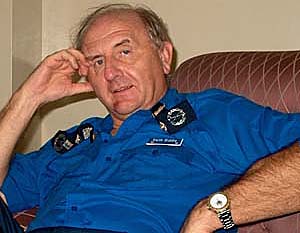Interview with Police Inspector-General Keith Biddle
Peter C. Andersen
17 June 2001 - Freetown, Sierra Leone
Sierra Leone Web
When veteran police officer Keith Biddle took over in July 1999 as
Inspector-General of Sierra Leone's beleaguered police force, he inherited a
department which had been substantially depleted by years of war and attrition,
and  undermined by a culture of corruption, fueled by successive
governments which had systematically starved the police of even basic resources.
undermined by a culture of corruption, fueled by successive
governments which had systematically starved the police of even basic resources.
Today, the British-born Biddle faces the daunting task of reforming the institution while at the same time preparing to extend police authority into areas of the country until now under rebel control. Asked to assess how things are going, Biddle pauses to choose his words carefully, while the sounds from the street below flood through the open window of his fourth-story office.
"It's not growing worse," he says. "Improvement? Yeah, there's improvement. We've got more integrity inside the force, particularly at the senior levels."
Biddle points out that half a dozen senior police officers are currently awaiting court appearances for offenses ranging from stealing public funds to smuggling to taking cash from prisoners. "We’ve concentrated very much in trying to clean up the management of the force," he says. But he notes too that there have been new complaints from the public in recent weeks of police officers taking money on the streets. "Having concentrated on the top, we will now try to deal with some of the low-level corruption," he says.
The IG knows that this task will not be an easy one. "The problem with low-level corruption is that a policeman is still not paid well," he says. "We’re looking at trying to get the pay improved." A police constable currently receives a basic monthly salary of Le42,000 — about $21.00 — plus allowances worth just over that. But with funds scarce, the government may at best be able to provide no more than a Le20,000 increase. "If I tell you that we improve the pay of a constable from what he gets now, even if we move him up three or four grades in the pay scale, he’ll only go up to just over Le60,000," Biddle says.
Sixty thousand leones: the rough equivalent of just two bags of rice, Sierra Leone's staple food. "There’s a certain amount of sympathy from some of the populace to give the policeman 200, 300, 500 leones when he puts his hand out," Biddle says. "So it’s a question then, is this corruption, begging, or is it really people supplementing a policeman’s wages? It’s very difficult."
Biddle stresses that reforming the police force is a personnel management problem, not only an operational one. "It’s a massive culture we’ve got to change. It’s not only stopping corruption. It’s changing culture. And part of the culture that’s changing for us is government providing the money to manage the force." Another part of the institutional culture Biddle wants to change is the police force's over-reliance on centralization, to the extent that even minor decisions affecting policemen in the provinces had to be made in Freetown. "We’ve got to get decentralized control out," he says. "The trick is appointing officers who are well-trained."
The police department is today some 2,000 officers below its maximum strength of 9,000. Perhaps 900 police were killed during Sierra Leone's decade-long civil war. With the record-keeping so poor, it's difficult to know for sure. Others have retired or died during that time. But Biddle says the force will be ready to deploy in former rebel-held areas when called upon to do so. "There’s still a lot of manpower in this force, still a lot of human resources, and a lot that is partly deployed," he says. "So one of the things we’re looking at is how do we more effectively employ the personnel that we’ve got." And many of the police officers who will eventually return to Kono and Kailahun are now in the capital. "We’re just reassembling the Kailahun Division," Biddle says. "There’s 200 of them in Freetown. And there’s some more in Kenema. There’s some more in Bo. So a lot of the divisions are still around to be put back together."
Biddle acknowledges that progress toward reform is slow, but he doesn't sound like a man who plans to leave Sierra Leone any time soon. "I’ll stay as long as President Kabbah wishes me to stay," he says. And while he remains guarded in predicting he will be successful in reforming the police force, he sees cause for hope. "I don’t feel pessimistic about it. I’m relatively optimistic," he says. "We’ve got some outstanding young police officers. And there’s no doubt that we can actually make a lot of progress. But there’s a lot more hard work to do. And if we really make a big omelet we’ve got to break a lot more eggs."
